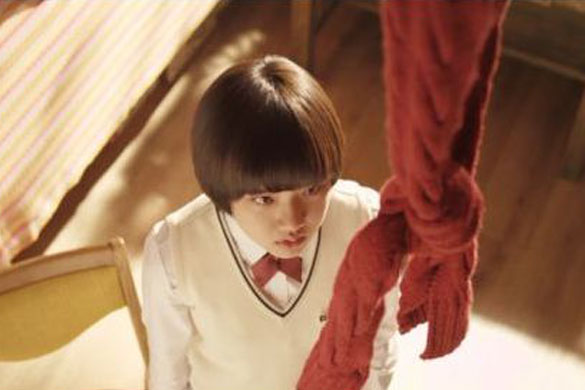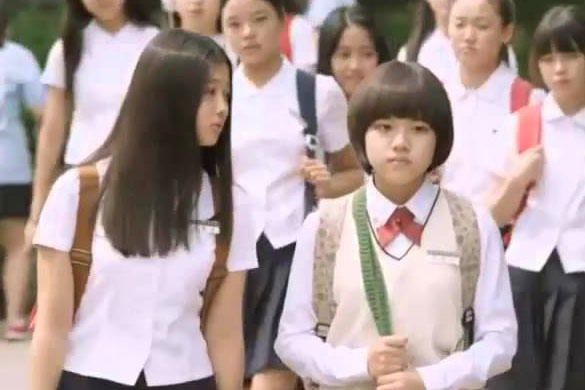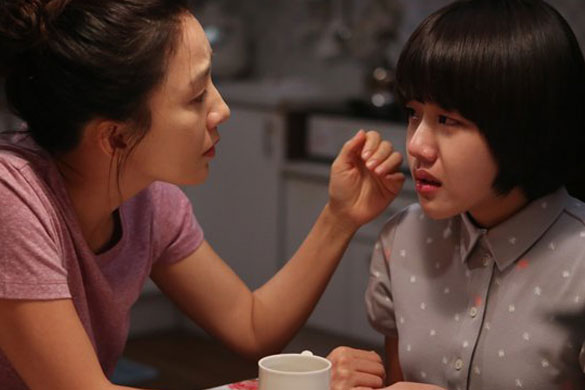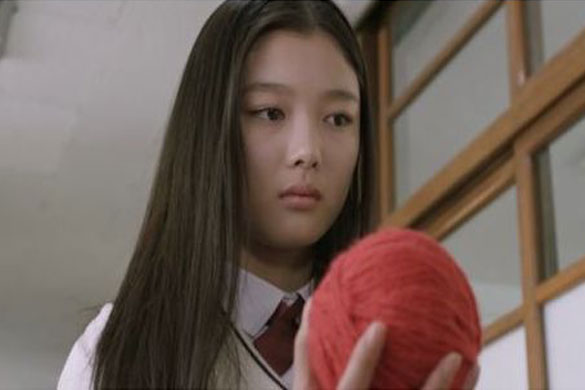"An apology in words is acceptable only when you can forgive.
If you get an apology you can't accept it will only stab you in the heart... especially when I have no intention of hearing it.
It's just a convenient excuse for you to hide behind. 'I apologised but she didn't accept it', that's what you'll say."
Synopsis:
Min-ji (Ko Ah-seong) has had an extremely close relationship with her younger sister Cheon-ji (Kim Hyang-ki) and mother Hyeon-sook (Kim Hee-ae) since the death of her father nine years ago and though, like any family, they have their differences from time to time, Min-ji is secure in the knowledge that they hide no secrets from each other and is sure that together they can face whatever day-to-day tribulations life throws their way.
So much so that when 14-year-old Cheon-ji commits suicide seemingly out of the blue, Min-ji and her mother are, as well as being utterly devastated, at an absolute loss to understand why she took her own life.
Unable to shake the fear that she may have completely missed her sister's cries for help, Min-ji begins to investigate Cheon-ji's school life and so-called friends and is immediately met with one contradictory story after another.
However, the discovery of a note (one of five) written by Cheon-ji and hidden in a ball of red wool strengthens Man-ji's resolve to untangle the thread of lies being told once and for all and discover what, or indeed who, was truly responsible for her sister's death...
Review:
The earliest scenes in 'Thread of Lies' give a snapshot of Cheon-ji's home and family life - Cheon-ji dutifully and meticulously ironing her and her sister's clothes while Min-ji scurries around late for school and in a panic; Cheon-ji being vocally appreciative of the efforts her mother has taken in making breakfast, in spite of her busy working life, while Min-ji refuses to eat the eggs on her plate because she doesn't like runny yolks; etc etc - and from viewers' initial perspective (and indeed the point of view of both Min-ji and Hyeon-sook) Cheon-ji's ever-beaming smile is a clear indication that she is as happy and content as she appears to be. However, as we are soon to discover, that very smile is the first of the myriad of falsehoods that form an increasingly intricate web of deceit linking the film's main characters and their individual stories together, with Cheon-ji as its centrepiece and ultimately its tragic victim.
Similarly, Cheon-ji's out of the blue request for first an MP3 player ("Because everyone else has one" - the second lie) and then for her mother to knit her a woolly hat out of red wool are taken at face value and even though Hyeon-sook notes that "something is up" - as her young daughter never usually asks for anything - neither she nor viewers at this point realise just how much lurks beneath the surface of this young girl's seemingly inocuous statements.
Though Cheon-ji's suicide (wisely not shown on screen) comes just seven minutes into the film's running time, these brief early scenes deftly point to the subtle manner in which 'Thread of Lies' will reveal pertinent information throughout the main (subsequent) narrative; on show from the outset for those who care (or have the hindsight knowledge) to read between the lines but shrouded in outward/vocal deceit, whether for manipulative ends or indeed self-preservation.
Following Cheon-ji’s suicide, the narrative, too, has far more to it than initially meets the eye: Not only is the main tale, as it indeed first appears to be, of Min-ji’s investigation into her sister’s school life, her friends and the terrible, veiled bullying and persecution she suffered - in an effort to allow Cheon-ji to rest in peace and in the process allow Min-ji to move on with her life, at least in some respect - but it is also a deeply insightful dissection of the secrets and unspoken issues that rule almost our every waking moment as well as a detailing of the fallout and consequences of bullying and even the fears that lie behind it; for those (of course) bullied but also for the very perpetrators of vicious persecution.
 |
Virtually every character we meet in ‘Thread of Lies’ is in some way connected with Cheon-ji’s tragic story - whether they themselves realise it or not - and each and every one of them is gradually shown to have something to hide; regardless of if they choose tell out-and-out lies to cover an ‘issue’ or conversely say little (lying by omission, if you like): Whether it’s schoolgirl Hwa-yeon’s outward (seeming) friendliness to Cheon-ji and her endless gift buying for her “friends”, covering her fear of becoming as unpopular as those she puts in that very position through her compliment-veiled intimidation; the real reason for Sang-park’s (Hyeon-sook and Min-ji neighbour) decision to grow his hair long; Hyeon-sook’s ex-boyfriend’s lies about the death of his wife; the numerous classmates of Cheon-ji who claim to have barely known her or anything about her; or even the truth behind Hyeon-sook’s decision to move to a new address following Cheon-ji’s death; each has their own agenda which, for good or bad, impacts far beyond their own needs and/or reasons in ways none of them could possibly have imagined... that is, if it hadn’t been for a bullied, persecuted and ultimately broken little girl being left (by them) feeling she had nowhere to turn but to end her life.
They (whoever ‘they’ are) say “Be sure your sins [or, in this particular case, lies] will find you out” and ‘Thread of Lies’ underlines that warning deftly time and time again throughout its nuanced narrative, but for me personally the most heartbreaking reference on show is the fact that throughout being bullied and persecuted Cheon-ji is fully aware of all that’s taking place and all that is being done to her and, in fact, even knows the part each and every person (directly or indirectly responsible) has played in her eventual belief that her life is no longer worth living.
Poignant as much as ‘Thread of Lies’ truly is on many occasions, three segments in particular stood out for me as reason enough on their own to make this stunning film a must see: Cheon-ji giving a heartfelt talk on persecution in front of her class (i.e. bullies) in school; her having a late-night conversation with Min-ji on bullying and the need for friends (making out she’s talking about a friend being bullied she asks Min-ji for advice and when her sister says she should not be friends with such people Cheon-ji simply says “But then who would I have to be friends with?”); her statement (with a single tear falling down her face) to another girl about the fact she knows the girl is bullying her regardless of her claims of innocence; and of course the perfectly thought out messages Cheon-ji hides in the balls of red wool. Separately, these add a huge amount of depth to the narrative but together they accurately (and clearly) speak to every person who has ever been the subject of cruel and focused bullying, in an utterly exemplary way.
 |
Over the years in Korean cinema, the subject of the bullying of children (whether inside school or out) has been detailed on numerous occasions and while many, many examples could be said to be deeply insightful, a huge number focus as much (if not more so) on the physical side of intimidation as its psychological aspects. Of course, this trend almost goes without saying considering the regular use of violence in Korean cinema as a whole but the downside is that some examples come out appearing as simply ‘more of the same’.
So intricately does ‘Thread of Lies’ detail the far more subtle (and some might say even more cruel) intimidation by back-stabbing disguised as friendship and compliment; false gossip; and two-faced lies specifically aimed at causing waves of pain that it allows this superlative statement on persecution to be far more true to life than any critique of physical brutality.
As such, ‘Thread of Lies’ easily, to my mind, stands as one of the most accurate, in-depth and ultimately believable stories on childhood bullying and persecution seen by this reviewer in recent years.
In a single narrative, ‘Thread of Lies’ perfectly details the ongoing thoughts and feelings of a young girl being bullied mercilessly, not only accenting the fallout to those closest to her (and their desperate attempts to, understandably, both exact some form of retribution and seek a way to move on and find closure) but also showing the myriad of issues behind the bullying itself and some of the very reasons its perpetrators choose it, not least as a means of deflecting gazes (and indeed) similar persecution from themselves.
 |
It should at this point probably be noted that there are also some genuinely funny moments throughout the film’s running time - Sang-park’s offer to help Hyeon-sook and Man-ji rid their flat of rats, becoming a ‘duck and cover’ moment when he actually sees the rodents; a balding work colleague of Hyeon-sook becoming increasingly obsessed with Sang-park’s hair and what shampoo he uses to the point where he asks him if he can touch it just once; etc etc - but while these small scenes are welcome and do somewhat lighten the load of a serious tale temporarily they thankfully never overstep their mark or detract from the important subject at hand. Make no mistake, ‘Thread of Lies’ is certainly not a story to be taken lightly but all of the above serves to make it all the more believable and true to life, to the nth degree.
All in all, ‘Thread of Lies’ feels from start to finish like a tragic real life tale; a story that not only should be told but that also truly needs to be seen.... and seen again.
Summary:
In focusing on the psychological aspects of bullying rather than the far more often seen examples of physical brutality, ‘Thread of Lies’ can delve far more deeply into the issue; in the process detailing the perspective of victim, perpetrator and bystander, alike. As such, ‘Thread of Lies’ is an incredibly insightful and deeply poignant discussion of childhood persecution that feels utterly true to life, from start to finish.
'Thread of Lies' (aka 'Elegant Lies' / 우아한 거짓말) / 2014 / directed by Lee Han
Cast: Kim Hee-ae, Ko Ah-seong, Kim Yoo-jeong, Kim Hyang-ki
|






